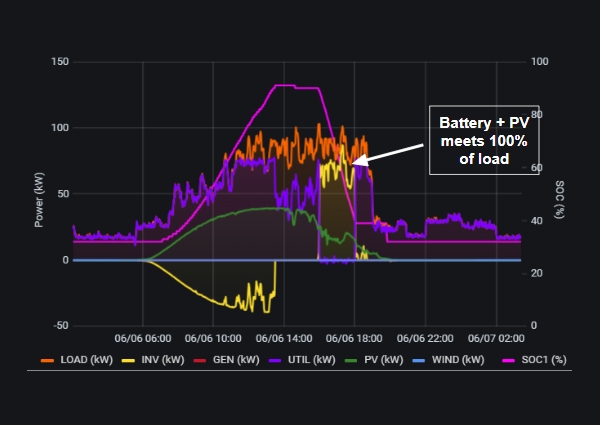Associating a value of resilience for backup power can help end users understand the value of their energy storage investment. Now, an increasing number of utilities are offering payouts for battery participation in the grid as well.
Leveraging Energy Storage for Demand Response in Microgrids
Article from | Ageto Energy
Many know that getting an energy storage microgrid project to pencil usually requires multiple revenue streams. The good news is there are an increasing number of opportunities to multiply the value of your battery, including leveraging energy storage for demand response.

Cost savings through utility rate optimization, such as demand charge management or energy arbitrage, is a common approach to slashing battery payback. Similarly, associating a value of resilience for backup power can help end users understand the value of their energy storage investment. Now, an increasing number of utilities are offering payouts for battery participation in the grid as well.
What is demand response?
So what exactly does it mean to use energy storage for demand response? Demand Response (DR) is a term that has existed for a long time, usually meaning a change in behavior that alleviates stress on the grid during periods of extreme electrical demand. Often, programs will offer a monetary incentive to consumers to decrease their loads when the grid-wide demand is beginning to stress the utility’s electrical capacity.
Now that energy storage has become a more familiar variable in the grid’s energy equation, it has become clear that energy storage for demand response is a valuable resource for utility operators. On the other side of the coin, energy storage for demand response programs has become an equally valuable component for battery energy storage payback.
Examples
Demand response programs come in many different forms and flavors. For example, the Northside Aztlan Community Center, one of Ageto’s projects in Fort Collins, Colorado, participates in a demand response program through the town’s municipal utility. The Fort Collins utility provides a signal directly to the ARC controller over an OpenADR 2.0b protocol. ARC then interprets the information in the signal and either charges or discharges the energy storage for the demand response program accordingly. Similar to how a commercial building can save money on its utility bill through demand charge management, this program will allow the municipal utility to reduce the amount of power purchased from its supplier, during expensive time blocks, and thus save on its own utility bill.
The demand response program for this all-electric hotel in New England serves a very similar purpose. However, instead of participating with the local utility that handles distribution, the hotel participates in ISONE’s demand response program through the aggregator CPower. ARC receives signals from CPower through a hardware gateway onsite and automatically controls the battery in response. The hotel owners receive a yearly payout for the average amount of energy they are able to discharge during these events.
Final thoughts
Demand response programs, and the protocols they use, still vary widely. When it comes to commercial microgrid controls, it is important to opt for a controller that is flexible and powerful enough to receive and interpret these signals. Leveraging energy storage for demand response turns your stationary asset into a revenue opportunity. The Ageto ARC controller automates the whole process so you never have to think about it.
Reach out to the microgrid experts at Ageto to learn more about energy storage for demand response programs in microgrids.
The content & opinions in this article are the author’s and do not necessarily represent the views of AltEnergyMag
Comments (0)
This post does not have any comments. Be the first to leave a comment below.
Featured Product

